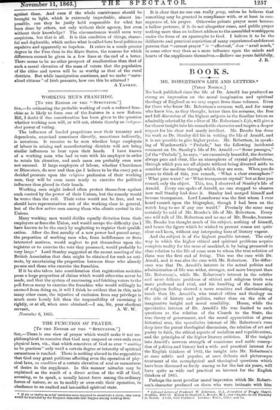WORKING MEN'S FRANCHISE.
[TO THE EDITOR OF THE " SFECTATOR."]
Sin,—In estimating the probable working of such a reduced fran- chise as is likely to form one of the features in a new Reform Bill, I doubt if due consideration has been given to the question whether working men will, or will not, obtain thereby an indepen- dent power of voting.
The influence of lauded proprietors over their tenantry and dependents, exercised sometimes directly, sometimes indirectly, is notorious. It remains to be seen whether large employers of labour in mining and manufacturing districts will not bring similar influences to bear upon their hands. I have known of a working man who had to vote with his employer in order to retain his situation, and such cases are probably even now not unusual. If large employers of labour, whether Churchmen or Dissenters, do now and then (as I believe to be the case) put a decided pressure upon the religious profession of their working men, they will be even more ready to exercise the political influence thus placed in their hands.
Working men might indeed often protect themselves against such control by the power of their Unions, but the remedy would be worse than the evil. Their votes would not be free, and we should have representatives not of the working class in general, but of the few active men among them who obtain control in the Unions.
Many working men would dislike equally dictation from their employers or from the Union, and would escape the difficulty (as I have known to be the case) by neglecting to register their qualifi- cation. After the first novelty of a new power had passed away, the proportion of working men who, from indifference or from interested motives, would neglect to put themselves upon the registrar or to exercise the vote they possessed, would probably be very large.* Lord Stanley suggested at the recent meeting of the British Association that data might be obtained for such an esti- mate, by ascertaining the proportion between those who already possess and those who exercise the franchise.
If it be also taken into consideration that registration societies press a large proportion of claims which would otherwise never be made, and that the system of canvassing and fetching voters to the poll forces many to exercise the franchise who would willingly be excused from doing so, it will I think be evident that in this, as in many other cases, the injustice of exclusion from any privilege is much more keenly felt than the responsibility of exercising it rightly, or at all, when once obtained.—I am, Sir, your obedient






























 Previous page
Previous page